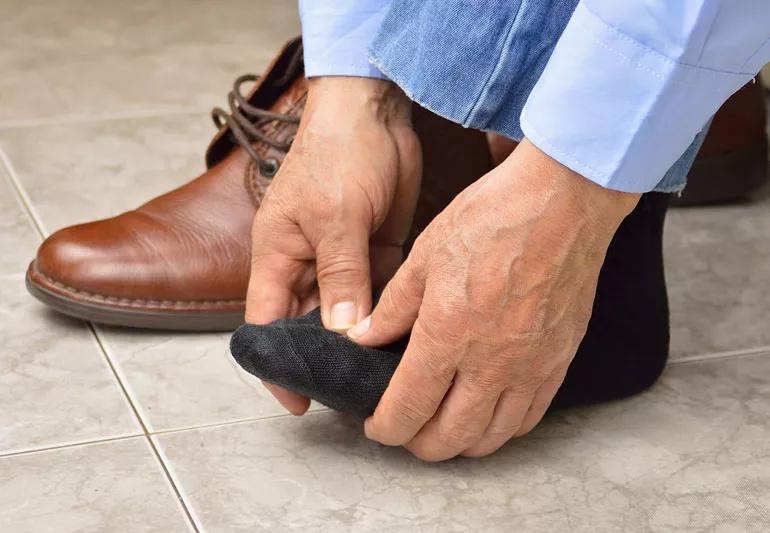The years can literally reshape your feet

Image content: This image is available to view online.
View image online (https://assets.clevelandclinic.org/transform/3930e9c9-e794-43cb-808b-f7fa4393aea8/shoesTight-819664910-770x533_jpg)
man massaging feet hurting from tight shoes
You’ve worn size 9 shoes for as long as you can remember. They always fit perfectly — and then one day, they just inexplicably don’t. Try as you might, you can’t cram a foot into that familiar size.
Advertisement
Cleveland Clinic is a non-profit academic medical center. Advertising on our site helps support our mission. We do not endorse non-Cleveland Clinic products or services. Policy
First, relax: You’re not going crazy. Second, it’s natural for your feet to gradually change in length and width over time. To explain how it happens, we turn to podiatrist Nicole Nicolosi, DPM.
With every step you take, your body absorbs two to three times its weight due to gravity’s unrelenting pull. That takes a toll on your feet — so much so that it actually changes their shape.
“The ligaments and tendons that support the arch in your foot become worn from use,” explains Dr. Nicolosi. “As that happens, the arch slowly collapses — and that flattening results in your foot getting a bit longer or wider.”
Most people gain weight as they get older — and those extra pounds press down on the ligaments and tendons that support your foot. As a result, your foot can widen or lengthen. “It adds up over time,” says Dr. Nicolosi.
Weight gain also can change the mechanics of how you walk, putting extra pressure and shape-changing forces on your feet.
Changes in how your body stores fat as you age also may impact how your feet look and feel.
The fat pads that cushion the bottom of your feet grow thinner as you grow older, which can make shoes fit differently. (Side note: Less fat on the bottom of your feet also means less shock absorption with every step, so you may get a few more aches and pains.)
Advertisement
Another “gift” that comes as the birthdays add up? Foot deformities such as:
The American Geriatrics Society reports that 1 in 3 people age 65 or older experience foot pain, with bunions ranking as the most common deformity.
During pregnancy, levels of the relaxin hormone in your body skyrocket. The aptly named hormone relaxes and increases the elasticity of ligaments to help with the demands of pregnancy and delivery.
“A main benefit of this involves the pelvis and cervix, but the hormone affects you throughout your body — and that includes your feet,” states Dr. Nicolosi.
Relaxing the ligaments in your foot sinks those all-important arches, allowing them to flatten out. The result is feet that become longer and wider. Studies show that the change is often permanent.
Will you just be able to look at your feet and tell whether they’re longer or wider? Probably not. But that’s why you’ll find shoe sizers — a measuring contraption known as a Brannock device — in most shoe stores.
“It’s important to get fitted for new shoes every so often to make sure you have a proper fit,” recommends Dr. Nicolosi. “Don’t assume your feet won’t change — because we know that they can and do.”
As you get older, too, an annual foot health check is also important. Your doctor can identify conditions like diabetes or circulatory problems by looking at your feet, or treat common problems like corns, cracked skin and ingrown toenails.
To hear more from Dr. Nicolosi on this topic, listen to the Health Essentials Podcast episode, “Talking Foot Health and Shoes.” New episodes of the Health Essentials Podcast are available every Wednesday.
Advertisement

Sign up for our Health Essentials emails for expert guidance on nutrition, fitness, sleep, skin care and more.
Learn more about our editorial process.
Advertisement
Except in certain medical scenarios, foot health experts rarely recommend foot soaks
One thing is for sure: This footwear definitely kicks up controversy
Most recommended precautions center around minimizing bruising or swelling
Even one drink can have an impact on your cognitive function leading to slurred speech, blurred vision and impaired memory
Understand who may (and may not) benefit
Lorem ipsum dolor sit amet. Et odio Quis vel ipsam omnis eum alias deleniti et placeat impedit non voluptas galisum hic autem enim et cupiditate aliquid. Est beatae quidem non facilis autem ut commodi nisi aut tempore rerum et dolores voluptatem cum enim optio id sapiente quasi. Ad laboriosam officiis 33 cupiditate sequi ea voluptatum consectetur qui necessitatibus voluptate et quasi doloremque et facere explicabo quo explicabo officia
Type 2 diabetes isn’t inevitable with these dietary changes
Applying a hot or cold compress can help with pain
Pump up your iron intake with foods like tuna, tofu and turkey